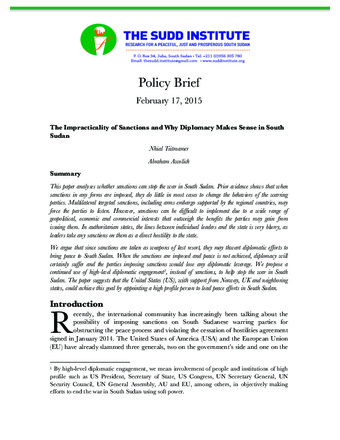The Impracticality of Sanctions and Why Diplomacy Makes Sense in South Sudan

Authors: Abraham Awolich, Nhial Tiitmamer
Organization: The Sudd Institute
Type: Policy Briefs
Date: 17/02/2015
Publication Summary
This paper analyses whether sanctions can stop the war in South Sudan. Prior evidence shows that when sanctions in any forms are imposed, they do little in most cases to change the behaviors of the warring parties. Multilateral targeted sanctions, including arms embargo supported by the regional countries, may force the parties to listen. However, sanctions can be difficult to implement due to a wide range of geopolitical, economic and commercial interests that outweigh the benefits the parties may gain from issuing them. In authoritarian states, the lines between individual leaders and the state is very blurry, as leaders take any sanctions on them as a direct hostility to the state.
We argue that since sanctions are taken as weapons of last resort, they may thwart diplomatic efforts to bring peace to South Sudan. When the sanctions are imposed and peace is not achieved, diplomacy will certainly suffer and the parties imposing sanctions would lose any diplomatic leverage. We propose a continued use of high-level diplomatic engagement, instead of sanctions, to help stop the war in South Sudan. The paper suggests that the United States (US), with support from Norway, UK and neighboring states, could achieve this goal by appointing a high profile person to lead peace efforts in South Sudan.
Abraham Awolich is the former Managing Director of the Sudd Institute. Awolich’s research has focused on management of development organizations working in conflict mitigation, governance and business management. Awolich is the co-founder of the Sudan Development Foundation and the former Executive Director of New Sudan Education Initiative (NESEI). Previous to joining the Sudd Institute, Awolich helped establish a secondary school in Yei and a medical clinic in Kalthok, Awerial County. Awolich has a Master’s Degree in Pubic Administration from the Maxwell School of Citizenship and Public Affairs at Syracuse University and Bachelor’s Degree from the University of Vermont in Anthropology and Business Administration. Awolich is a McNair Scholar and winner of the prestigious Samuel Huntington Public Service Award in 2006.
Nhial Tiitmamer has served as the Director of the Environment and Natural Resources Program at The Sudd Institute where he is currently on leave to work with United Nations in South Sudan (UNMISS). He has served as an Adjunct Assistant Professor at the University of Juba where he has taught Environmental Economics, Natural Resources Economics and Environmental Sociology. Between November 2021 and November 2022, Nhial worked as Senior Environment Associate with the United Nations High Commissioner for Refugees (UNHCR) in Juba. Before returning from Canada in 2013, Nhial worked at Arletta Environmental Consulting in Calgary and at University of Alberta’s Augustana Campus in Camrose in Alberta, Canada. Nhial’s research focusses on natural resources governance, environmental protection, climate change, and sustainable energy. He was awarded in May 2023 by the Board of Directors of The Sudd Institute with Research Impact Award for policy impacts. Nhial holds a B.A. in Environmental Studies with a minor in English Literature from the University of Alberta and an M.Sc. in Sustainable Energy Development from the University of Calgary in Alberta, Canada.
